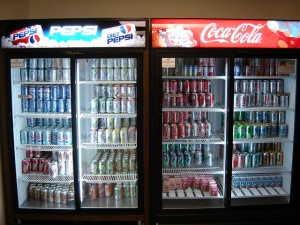We've seen it with tobacco. As taxes went up, use went down. Public health advocates have been salivating over the prospect of a tax on sugar-sweetened beverages to gain a similar foothold in the obesity epidemic and the myriad health problems excess weight causes. But hard evidence on the health effects of such a tax has been limited.
A new study in today's Health Affairs, quantifies the impact quite nicely. A nationwide penny-per-ounce tax, the authors estimate, would reduce sugar-sweetened beverage consumption by 15 percent. They say that modest reduction will lead to modest weight loss, which in turn leads to modest reductions in diabetes. After the researchers crunched all the numbers, all those modest reductions would, over ten years, result in 26,000 lives saves (or avoiding "premature deaths" as researchers prefer to say).
There would also be 95,000 fewer instances of heart disease and 8,000 fewer strokes.
Why all the fuss about sugar-sweetened beverages? Americans guzzled 13.8 billion gallons of them in 2009. "These beverages represent the largest source of added sugar and excess calories in the American diet and have been linked to weight gain and type 2 diabetes," the authors write.
Kirsten Bibbins-Domingo, an epidemiologist at UC San Francisco, was the senior author of the study. "We knew that diabetes was a big problem and if you could do something to reduce risk of diabetes, that you would have a big impact. But we're always surprised when we look at the numbers when a relatively small impact could have such a large and measurable benefit in terms of diabetes."
